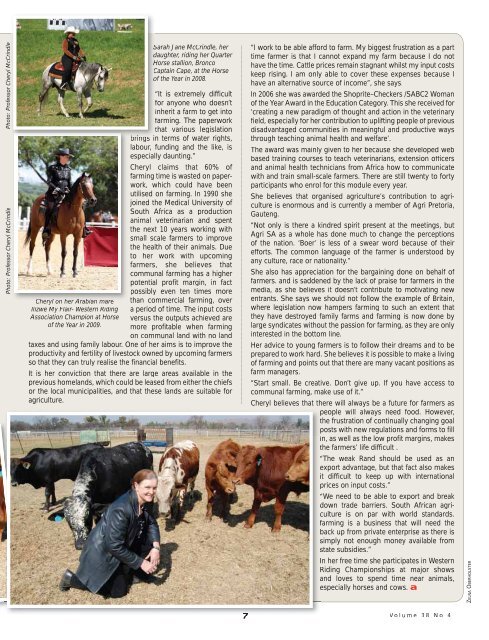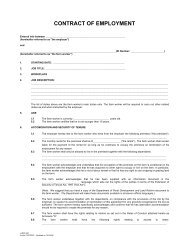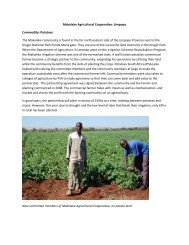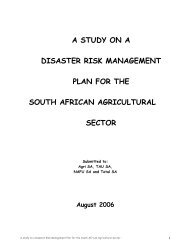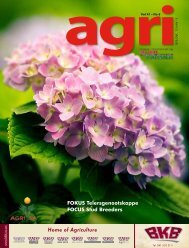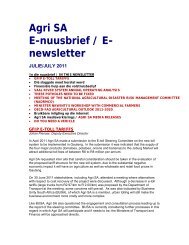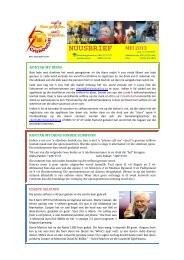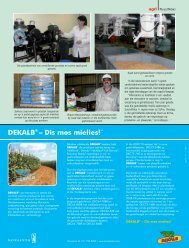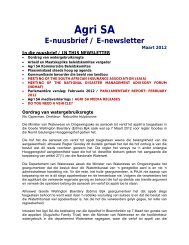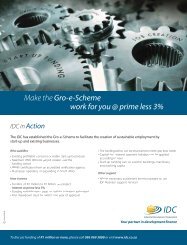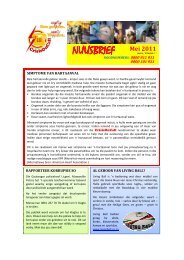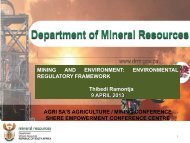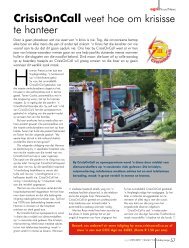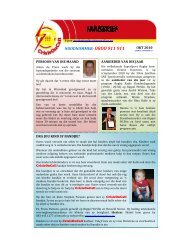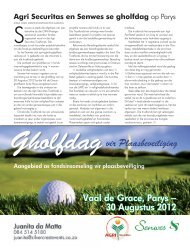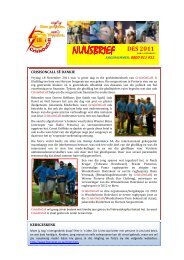Agri AUG SEPT 09.indd - Agri SA
Agri AUG SEPT 09.indd - Agri SA
Agri AUG SEPT 09.indd - Agri SA
Create successful ePaper yourself
Turn your PDF publications into a flip-book with our unique Google optimized e-Paper software.
Photo: Professor Cheryl McCrindle<br />
Photo: Professor Cheryl McCrindle<br />
Cheryl on her Arabian mare<br />
Ilizwe My Flair- Western Riding<br />
Association Champion at Horse<br />
of the Year in 2009.<br />
Sarah Jane McCrindle, her<br />
daughter, riding her Quarter<br />
Horse stallion, Bronco<br />
Captain Cape, at the Horse<br />
of the Year in 2008.<br />
“It is extremely difficult<br />
for anyone who doesn’t<br />
inherit a farm to get into<br />
farming. The paperwork<br />
that various legislation<br />
brings in terms of water rights,<br />
labour, funding and the like, is<br />
especially daunting.”<br />
Cheryl claims that 60% of<br />
farming time is wasted on paperwork,<br />
which could have been<br />
utilised on farming. In 1990 she<br />
joined the Medical University of<br />
South Africa as a production<br />
animal veterinarian and spent<br />
the next 10 years working with<br />
small scale farmers to improve<br />
the health of their animals. Due<br />
to her work with upcoming<br />
farmers, she believes that<br />
communal farming has a higher<br />
potential profit margin, in fact<br />
possibly even ten times more<br />
than commercial farming, over<br />
a period of time. The input costs<br />
versus the outputs achieved are<br />
more profitable when farming<br />
on communal land with no land<br />
taxes and using family labour. One of her aims is to improve the<br />
productivity and fertility of livestock owned by upcoming farmers<br />
so that they can truly realise the financial benefits.<br />
It is her conviction that there are large areas available in the<br />
previous homelands, which could be leased from either the chiefs<br />
or the local municipalities, and that these lands are suitable for<br />
agriculture.<br />
7<br />
“I work to be able afford to farm. My biggest frustration as a part<br />
time farmer is that I cannot expand my farm because I do not<br />
have the time. Cattle prices remain stagnant whilst my input costs<br />
keep rising. I am only able to cover these expenses because I<br />
have an alternative source of income”, she says.<br />
In 2006 she was awarded the Shoprite–Checkers /<strong>SA</strong>BC2 Woman<br />
of the Year Award in the Education Category. This she received for<br />
‘creating a new paradigm of thought and action in the veterinary<br />
field, especially for her contribution to uplifting people of previous<br />
disadvantaged communities in meaningful and productive ways<br />
through teaching animal health and welfare’.<br />
The award was mainly given to her because she developed web<br />
based training courses to teach veterinarians, extension officers<br />
and animal health technicians from Africa how to communicate<br />
with and train small-scale farmers. There are still twenty to forty<br />
participants who enrol for this module every year.<br />
She believes that organised agriculture’s contribution to agriculture<br />
is enormous and is currently a member of <strong>Agri</strong> Pretoria,<br />
Gauteng.<br />
“Not only is there a kindred spirit present at the meetings, but<br />
<strong>Agri</strong> <strong>SA</strong> as a whole has done much to change the perceptions<br />
of the nation. ‘Boer’ is less of a swear word because of their<br />
efforts. The common language of the farmer is understood by<br />
any culture, race or nationality.”<br />
She also has appreciation for the bargaining done on behalf of<br />
farmers. and is saddened by the lack of praise for farmers in the<br />
media, as she believes it doesn’t contribute to motivating new<br />
entrants. She says we should not follow the example of Britain,<br />
where legislation now hampers farming to such an extent that<br />
they have destroyed family farms and farming is now done by<br />
large syndicates without the passion for farming, as they are only<br />
interested in the bottom line.<br />
Her advice to young farmers is to follow their dreams and to be<br />
prepared to work hard. She believes it is possible to make a living<br />
of farming and points out that there are many vacant positions as<br />
farm managers.<br />
“Start small. Be creative. Don’t give up. If you have access to<br />
communal farming, make use of it.”<br />
Cheryl believes that there will always be a future for farmers as<br />
people will always need food. However,<br />
the frustration of continually changing goal<br />
posts with new regulations and forms to fill<br />
in, as well as the low profit margins, makes<br />
the farmers’ life difficult .<br />
“The weak Rand should be used as an<br />
export advantage, but that fact also makes<br />
it difficult to keep up with international<br />
prices on input costs.”<br />
“We need to be able to export and break<br />
down trade barriers. South African agriculture<br />
is on par with world standards.<br />
farming is a business that will need the<br />
back up from private enterprise as there is<br />
simply not enough money available from<br />
state subsidies.”<br />
In her free time she participates in Western<br />
Riding Championships at major shows<br />
and loves to spend time near animals,<br />
especially horses and cows. a<br />
Volume 38 No 4<br />
ZELNA OBERHOLSTER


